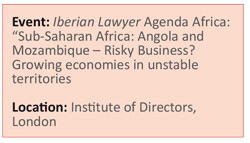African governments ‘must tackle credit rating issues’ to lure investors
Countries in sub-Saharan Africa – such as Angola and Mozambique – are making progress on introducing business-friendly reforms, but ‘predictability in regulation´ is crucial
Embracing important regulatory reforms – and tackling credit rating issues – are among the steps governments across Sub-Saharan Africa and, in particular, those of Angola and Mozambique, need to take to attract international investors in key economic sectors, attendees at the Iberian Lawyer Agenda Africa event in London heard.
Participants were told that, although both countries have been making significant strides in recent years, there is still plenty of room for improvement regarding the introduction of business-friendly policies. Such policies are seen as being of vital importance in strategic sectors, such as infrastructure, technology, agriculture and mining, and will underpin these countries’ path towards economic diversification.
The recent decline in global oil prices has had a different impact in each country. Whereas Angola, whose economy is heavily reliant on oil exports, has been prompted to implement drastic measures – such as revisions to its private investment law – Mozambique’s agriculture-based financial system has benefited from a series of supportive policies previously implemented.
“The Angolan government is revising its private investment law, which dictates that companies willing to set up shop in the country need to invest US$1 million if they want to repatriate their dividends or get access to tax breaks,” said Nuno Alves Mansilha, partner at Miranda, Correia, Amendoeira & Associados. He added that the regulation has been a great hurdle in terms of attracting foreign investment.
‘Appalling law’
This view is echoed by Pedro Guimarães, partner at FCB&A, who said that “2011’s foreign investment law was appalling in terms of diversification of the economy – this requirement of a millionaire threshold was discouraging for small investors”. Although the Angolan government had put in place economic policies over the 2009-2014 period, which led to a doubling of its foreign reserves, the global decline in oil prices led to a wake-up call in other areas. “Diversification of the economy is actually a result of the current crisis,” Guimarães said. “Although the idea had been around for quite some time, the problem is that they did not know how to do it, nor have they had any inducement to do it.”
Conversely, Mozambique has fared rather well in this area. Panel members at the event said initial investment required to establish a business in the country is in the region of $80.000. This, combined with several double taxation treaties – and a more flexible foreign exchange regime in comparison to Angola – makes it a more interesting market for international investments, in the opinion of Mansilha. “However, everyone is expecting to see the results of the Fifth Licensing Round, which was announced in London in January, and has been postponed ever since,” he added.
Farmers losing crops
Panel members emphasised the importance of badly-needed infrastructure investment to secure economic growth in Lusophone Africa. “Because of the lack of infrastructure in the form of roads and storage facilities, most farmers lose about half of their crops in the process of taking them to the market,” said Teresa Empis Falcão, partner at Vieira de Almeida.
Participants identified several areas in which policy-makers and governments could take steps in order to boost the prospect of investment. Firstly, the countries’ low or non-existent credit rating, which makes it difficult for them to access public entities or capital markets to raise funds. Secondly, local banks’ inability to provide funds for projects of that magnitude. Ultimately, “we need predictability of regulation together with macroeconomic stability to mitigate political risk”, Empis Falcão said.
Finally, Hugo Rosa Ferreira, partner at PLMJ, stressed the role of local law firms’ in bridging the cultural gap. “There’s a pivotal role in the substantive translation as opposed to a literal translation of international governance compliance standards into rules and practices that are adapted to the local environment and to the local reality,” he said.
Watch the summery of the sessions
| Part 1 | Part 2 |











